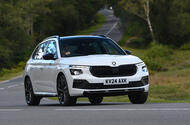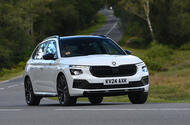Right-sized SUV joins the fleet without an electric motor in sight
Update 1
In just over a decade’s time, pure-petrol cars will be exclusive to the used market. Actually, that point could come even sooner.
The new Labour administration is discussing plans to bring back the original 2030 ban on new internal-combustion-engined car sales (it was pushed back five years by the Conservatives last year) and some automotive timelines are prioritising electrified vehicles by the time we enter the 2030s.
This all means that cars such as our new Skoda Kamiq, with its 1.5-litre four-cylinder turbocharged petrol engine (that’s right: no hybrid assistance here), are a dying breed. So we’re here to find out, over the coming months, if such powertrains will be missed.
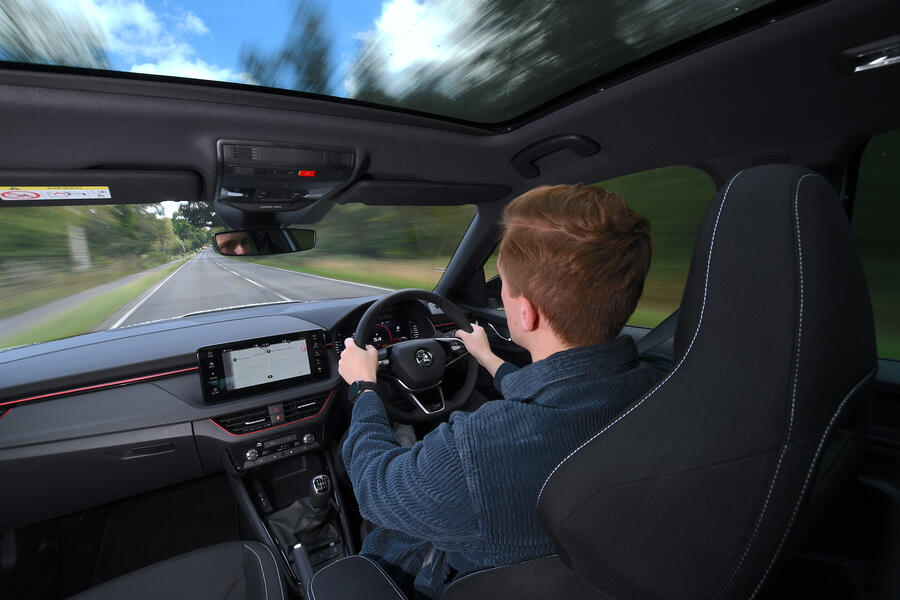
To introduce you, the Kamiq is Skoda’s smallest ‘big’ car, sitting below the Karoq, Kodiaq and electric Enyaq. It was launched in 2019 and refreshed last year (it’s not conventionally pretty, giving off Star Wars Stormtrooper vibes), and it’s positioned as a raised and slightly roomier alternative to the Scala. Its target market is smaller families shopping in the highly populated B-SUV segment.
Being a Skoda, the Kamiq is priced very competitively, from just £24,040 (which gets you a 94bhp 1.0-litre turbo petrol triple and five-speed manual). That positioning has pushed it to become one of the Czech brand’s best-sellers in the UK, matching the stalwart Octavia with some 16,000 sales since the start of last year.
Our car is the top-rung Monte Carlo Kamiq. Sounds sporty, right? Well, think less Toyota GR Yaris and more Yaris GR Sport: this is style over substance. So while nothing changes underneath, inside you get squidgy, bucket-like sports seats, a panoramic glass roof, dual-zone climate controls and a 10.25in digital driver’s display.
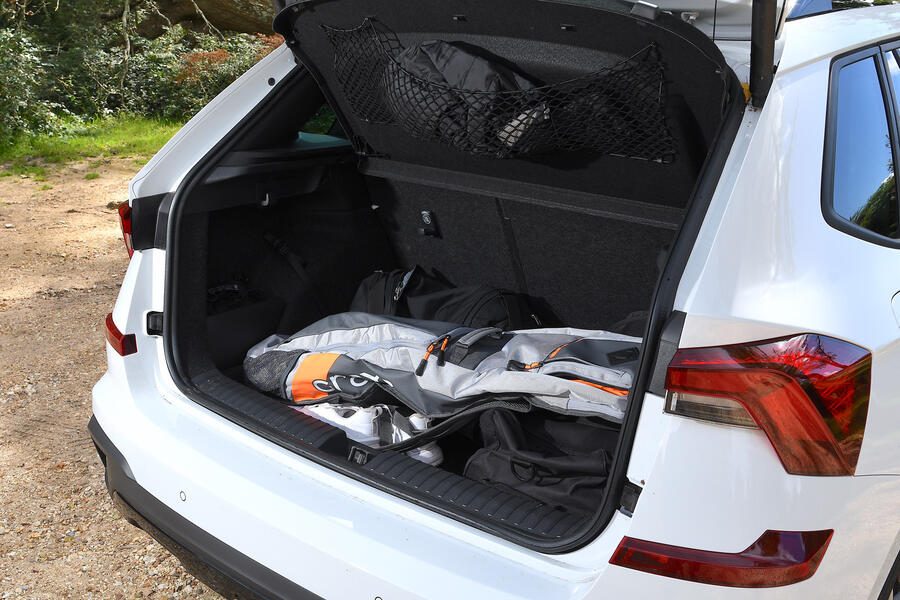
And it rolls along on smart 18in alloys. At £31,580, which includes optional £660 Moon White paint (I was surprised to find this wasn’t a standard colour), it’s still a bit of a bargain. But don’t expect a luxury model: this Kamiq is a workhorse at heart, given away by its manually adjustable seats and mostly plastic interior.
Now that you’ve met, let’s talk about first impressions. The Kamiq is no-frills wonderful. No, we’re not EV haters here at Autocar: far from it, as they’re becoming more and more brilliant by the day.
But one thing that electric powertrains remove (ignoring the interesting transmission work currently being done by Toyota/Lexus) is the need for conventional gearing and therefore a gearbox. And for car lovers, the analogue, hands-on experience that a stick-shifter offers really can’t be matched.
So to have a six-speed manual transmission in the Kamiq is a real delight: the clutch pedal has a lovely weight and spring to it and the lever offers a pleasing feel. However, the gating feels a tad closer than that in rivals such as the Kia Stonic, so I’ve already found myself in third when I’m hunting for first. That’s something to keep an eye on over the coming months.
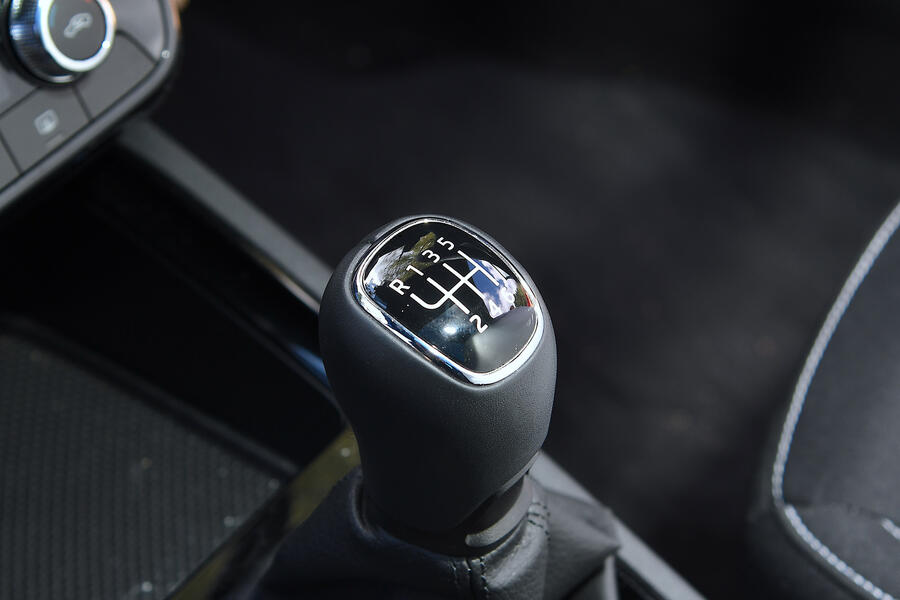
The Kamiq also drives really well. In our short time together so far, it has proved to be both a solid motorway hauler and a nippy around-town runabout. That’s thanks in part to its pedigree: it may be relatively new, but as it sits on the Volkswagen Group’s
incredibly versatile MQB platform, it shares the same underpinnings as cars ranging from the Audi A1 to the Volkswagen T-Cross.
It’s a deceptively big car, too. At 4241mm long, 1793mm wide and 1562mm tall, it’s no bigger than the Nissan Juke but offers 400 litres of seats-up boot space – enough to fit, as I’ve already discovered, a lot of sports gear and a cockapoo. Plus you get generous rear leg room and practical touches such as bag hooks, deep storage bins and an actual bin.
That practical approach manifests in the Kamiq’s usability, too, with a host of physical buttons and switches for key controls such as cabin temperature. A proper volume switch, rather than a non-haptic touchpoint on the 9.2in infotainment screen, feels an oversight.
There is, though, a roller on the steering wheel. Additional plus points come from wireless Android Auto and Apple CarPlay, which means no more cable faffing.
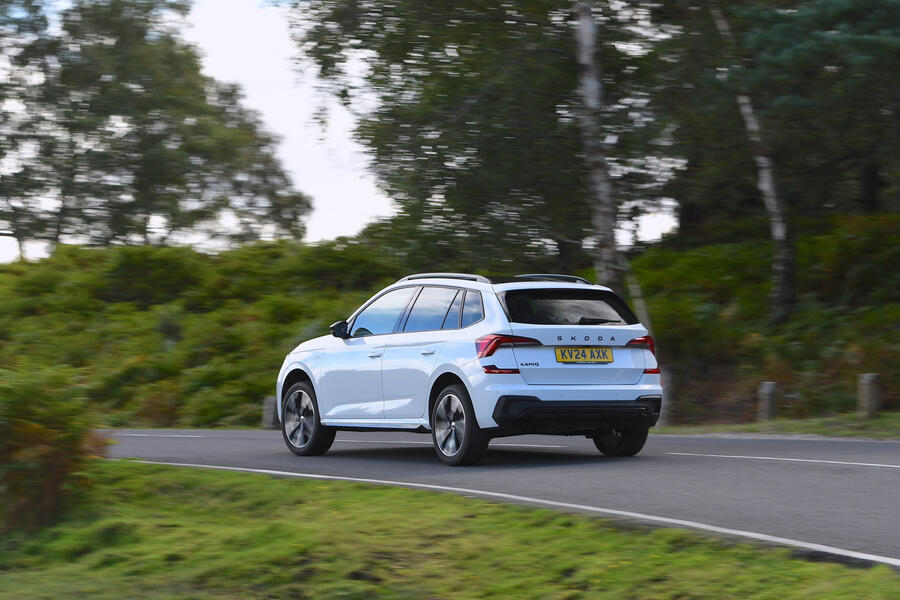
A divisive quirk is the seating position: compared with similarly sized rivals, you sit low to the floor, giving it more of a hatchback feel on the move. I really like that, but my partner, who drives a crossover, isn’t a fan. You can pump up the seat, but the layout doesn’t suit it.
One positive is that it promotes quite an enjoyable driving experience, especially from what I’ve found so far on back roads. This is aided by the light, smooth steering and enhanced by its short (2651mm) wheelbase. An added bonus is incredibly easy manoeuvrability in tight car parks.
Add in that the 148bhp 1.5-litre turbo engine is already returning close to 50mpg and this is starting to look like a bona fide bargain.
It will be interesting to see if anything begins to grate once our honeymoon period fades away and whether it will be the Kamiq’s practicality or its economical powerplant that becomes the star of the show.
Road trips are already planned, including a cross-continent expedition, and I can’t wait.
Update 2
Many of my friends think I’m a little loopy.
“I promise you,” I say, and they once again ask if I’m feeling all right. This is after my latest attempt to peddle Skoda to those who think BMW, Mercedes-Benz, Audi and Land Rover are the only manufacturers whose models you can ever really want to own.
Yet the Skoda Kamiq genuinely is a car that could very well end up sitting on my (imaginary) driveway if I had the need to buy something family-oriented that is able to do all the basics brilliantly.
I’ve totted up more than 6000 miles in this sparky little crossover, on everything from inner-city spurts to long hauls, and I’m struggling to think of many gripes.
Yes, its 1.5-litre turbo petrol four could be more powerful, but then it counters that with a fuel economy of 52mpg, which makes my long commute from Southampton to Autocar headquarters in Twickenham incredibly cheap.
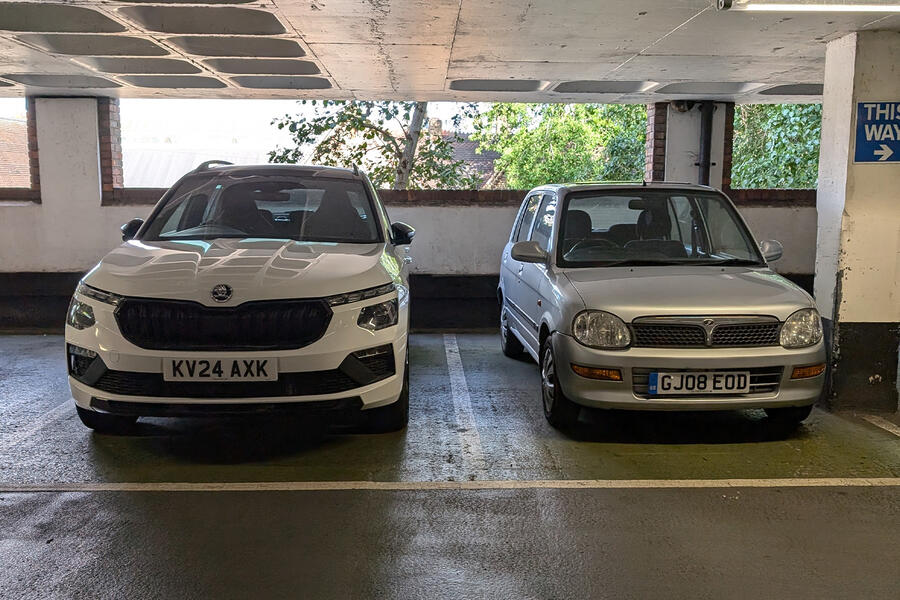
Yes, the interior could be a bit plusher, considering that this is a Monte Carlo-badged range-topper, but then it still has nicely sculpted seats and a full-length sunroof – and because it’s not meant to be lounge-quality, I don’t really mind getting dirt and mud in it.
And yes, the gearbox’s gating needs to be better separated (I’ve put it into third when looking for first far too many times) but, bar that, the manual shifter is a relatively slick unit – and I do love a manual.
What’s more, it has some features that I can see would be very useful for those with children. For example, the Monte Carlo gets a phone holder mounted on the front seatbacks to make watching films easier, an actual bin (with bin bag) and even an umbrella stored in the driver’s door. And anybody will be grateful for the ice scraper found behind the fuel filler cap. Skoda really is a brand of the people.
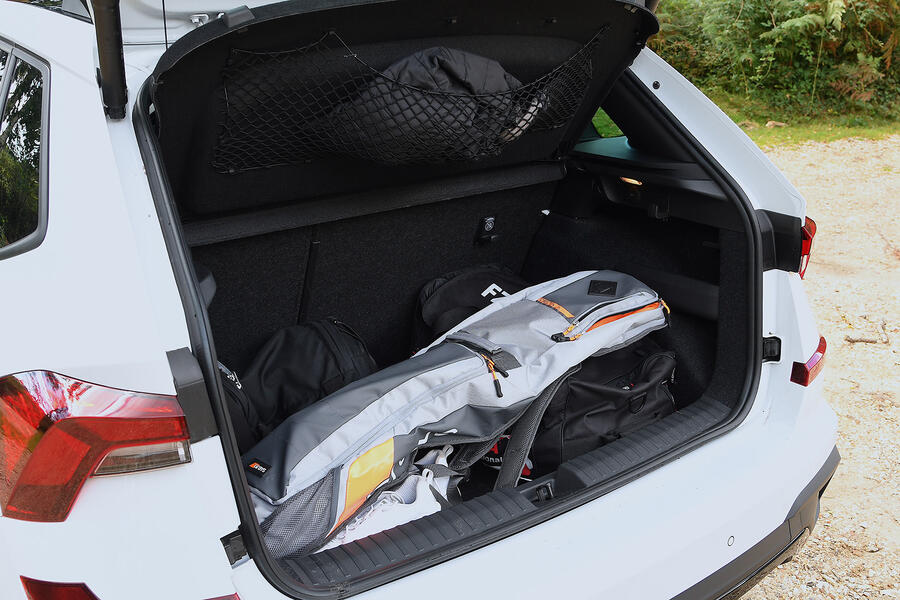
Now, combine all this and the £29,435 starting price that the Czech company is asking for seems like a Black Friday deal. Only really the Kia Stonic seems as much of a bargain in this area of the market.
And it gets even better when you realise that the Volkswagen T-Cross and Taigo cost £31,825 and £32,830 in equivalent specifications, despite essentially being the same car underneath (although admittedly they’re both also automatics).
I am aware of the elephant in the room: the Kamiq isn’t exactly a looker. But most wouldn’t say it’s outright ugly either, and perhaps it would make a better impression in a colour, rather than plain white.
So, to again fly the flag: do you want a car that does everything a car should do, that you don’t mind scuffing a little, will drive like a Volkswagen, will help keep your kids entertained, costs less than £30k to buy, is cheap to run, is cheap to insure and whose sole detracting feature is a face that only its mother could truly love? Well, why don’t you drive a Skoda Kamiq then?
Update 3: Verdict
As a child, I was always told: “You don’t get anything for free.”
But, according to Skoda, that’s not true. Apparently, you do get some things for free as a Skoda driver. And it always delighted me how many of these unexpected extras my Kamiq offered, from built-in umbrellas and ice scrapers to a kid-friendly phone holder and even an actual bin (complete with a bin bag).
While many such items may never get used by a typical driver, these little things really endeared me to this Skoda crossover and made me feel much more connected to it than other cars I’ve driven over the same period. This warmth is something I’m really going to miss now the Kamiq has left our fleet.
To recap, the Kamiq is Skoda’s smallest SUV and sits below the Karoq, Kodiaq and electric Enyaq. It is aimed at smaller families looking for a bit of a bargain (it starts from £24,040) and those who don’t mind driving something that’s not conventionally pretty – or are big Star Wars fans. (Anyone else getting Stormtrooper vibes?)
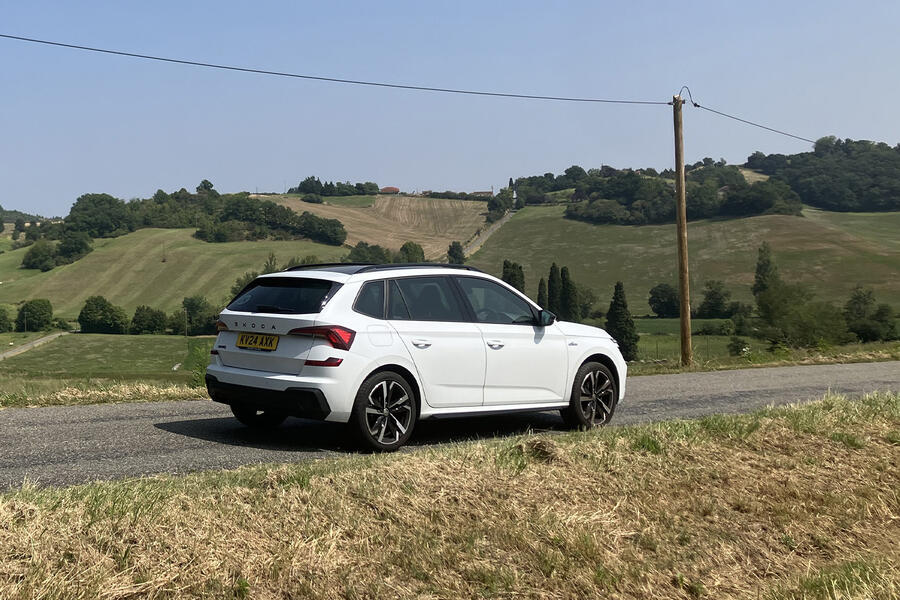
Our car was the top-rung Monte Carlo version. That may sound sporty but it couldn’t have been further from a rally car. Priced at £31,580, it came with a lot of kit, such as a panoramic glass roof, dual-zone climate control, bucket-like sports seats and a 10.25in digital driver’s display.
Those seats were fantastic for long journeys and offered plenty of adjustability. The physical interior switches that operated the climate settings, as well as the rollers and buttons on the steering wheel, were also brilliant and made the Kamiq such an easy car to live with – although you needed to use the screen to activate dual-zone syncing, which I found irritating.
Speaking of the screen, this was one of the main areas that let the Kamiq down: it was slow, didn’t always respond to inputs and felt about 10 years old. It did, however, have wireless Android Auto and Apple CarPlay – and this was always on given that the built-in maps were a bit useless.
Still, storage space was excellent and the deep, 400-litre boot provided enough room for all of my sporting goods and then some.
Being a Skoda, the load bay also featured an array of handy extras, such as hooks and – my personal favourite – a luggage net built into the parcel shelf.
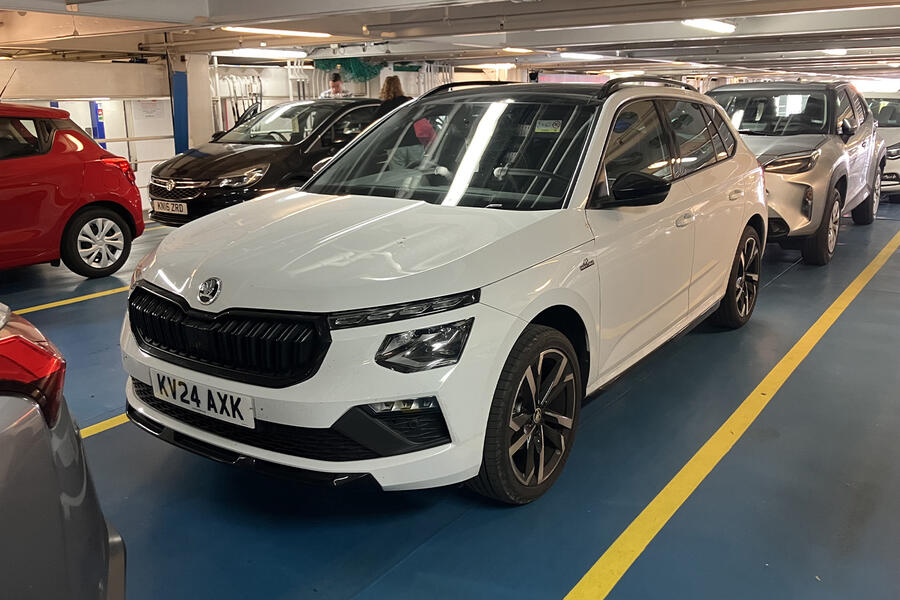
But a crucial reason for running the Kamiq was to assess whether it makes a case for petrol-only powerplants in a market swelling with the arrival of new EVs and hybrids. And, yes, it does.
The 1.5-litre four-cylinder turbocharged petrol engine that exclusively powers this Kamiq is probably one of its best assets. Not only is it relatively smooth in its running, but it also returned around 52mpg over my 7000 miles with it, which is a match for many hybrids (such as the Honda HR-V) that I’ve driven recently.
It is also above Skoda’s claimed average of 47.8mpg. On top of that, its decent-sized fuel tank (53 litres) means that brimming it will cost around £70 and provide just over 600 miles of range.
Finally, we come to the thing I most love and hate about the Kamiq: its six-speed manual gearbox. To have a shifter in a new car in 2024 is a real delight, given so many car makers (sibling Volkswagen is one of the biggest) have ditched them in many models on cost grounds.
In the Kamiq, the clutch had a good weight and spring to it, but the gearbox’s gating always felt a tad closer than it needed to be – especially compared with rivals such as the Kia Stonic – and I found myself pulling away in third instead of first too many times to count.
To sum up, the Kamiq is no-frills wonderful, with minimal gripes to report. It does so much well and is priced so sensibly, but it will often be overlooked for more fetching alternatives.
If you’re a footy fan, this is the Michael Carrick of the car world: it does everything really well but in an uncomplicated and unshowy way so it will never get the credit it deserves. So with clever hybrids and futuristic electric cars dominating the headlines, don’t forget about the plucky Kamiq.

